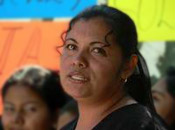WELCOME TO THE ARCHIVE (1994-2014) OF THE MAQUILA SOLIDARITY NETWORK. For current information on our ongoing work on the living wage, women's labour rights, freedom of association, corporate accountability and Bangladesh fire and safety, please visit our new website, launched in October, 2015: www.maquilasolidarity.org
When the Hermosa garment factory in El Salvador closed in May 2005, it left the workers with no jobs, severance pay, back pay, or health benefits. Labour rights groups in Europe, the US, and MSN in Canada pressured major brands to take responsibility for their supplier's irresponsible actions.
The closure announcement came shortly after the workers won the registration of a union. Hermosa management had a long history of worker rights violations, particularly concerning wages and social security contributions. After the factory closed, workers learned that the owner, Mr. Montalvo, had failed to pay US$353,000 in government social security and pension fund premiums, dating back to 1996.
Workers and the groups supporting them had exhausted all legal channels to pressure the factory owner and the Salvadoran authorities to act responsibly. They asked allies to increase pressure on brands to resolve the case. Buyers at Hermosa included adidas, Nike, Russell Athletic, Wal-Mart (White Stag), Kids Connection, and Speedo.
Many of them were willing to try to convince the factory owner to fulfill his legal obligations and to urge the Salvadoran government to enforce its laws and hold job fairs for ex-Hermosa workers. But they were reluctant to directly compensate the workers, fearing it might set a precedent for similar cases in the future.
In response to the brands’ concern that paying workers the full compensation owed might set a precedent for the future, Flor Jazmín, Secretaria de Actas de la Junta Directiva stated, “Brands perhaps should be more concerned about the negative precedents set by successive failures of their audits to uncover violations, including that the owner hadn’t been making legally required contributions to the social security program, and by the precedent set by the Salvadorian government in failing to meet its own legal responsibilities.”
Click here to read MSN’s investigation on this case.

Estela Ramirez, ex-Hermosa worker
Credit: Christliche Initiative Romero
A new report prepared by the Maquila Solidarity Network for the Fair Labor Association (FLA) documents the desperate situation of former employees of the Hermosa Manufacturing facility in El Salvador, which closed in May 2005, leaving former Hermosa workers without jobs, back wages, severance pay, health insurance and employee pensions. MSN's report identifies next steps to rectify the injustices suffered by the Hermosa workers, and actions that buyers can take to prevent future "Hermosas".
Following the release of MSN’s report, MSN met with ex-Hermosa workers to discuss the findings. While they agreed with most of the study’s recommendations, workers had criticisms.
A short history of and background to the case, steps taken to date to engage with the buyers, the factory owner, and the Salvadoran authorities, and further resources on the Hermosa case.
(January 2007) A new fund set up by the Fair Labor Association provides some compensation to Hermosa workers, but critics say it’s not enough.